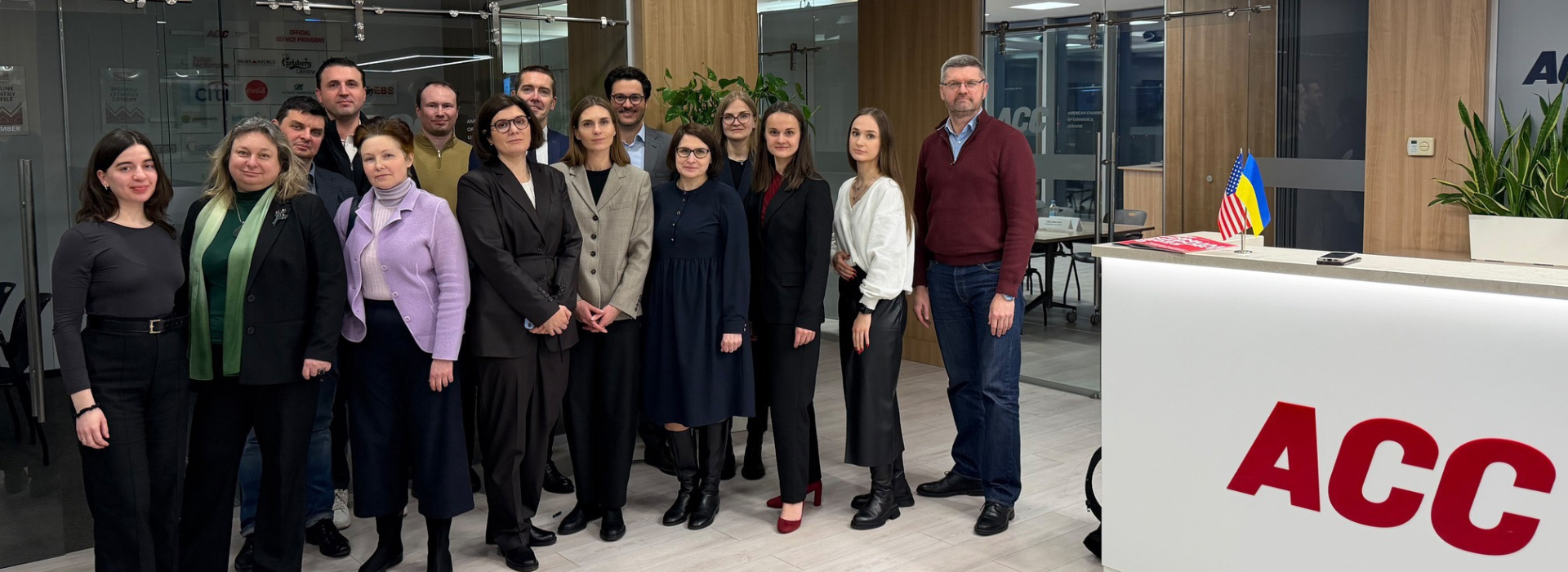Tuesday, June 11, 2024
81% of companies in Ukraine stated that military mobilization has an impact on their business performance. The American Chamber of Commerce in Ukraine and Citi Ukraine present the results of the survey Ukraine Wartime Business Assessment during the Ukraine Recovery Conference in Berlin on June 11-12.
The survey aims to assess the current state of business in wartime Ukraine: how companies are performing, key challenges, tools, and support needed to succeed, the availability of access to war risk insurance and financing, and Ukraine's judiciary effectiveness.
The key challenges of doing business in 2024 are reservation of employees from military service (80%), safety and security of staff (75%), employees' health and mental well-being (50%), electricity outages (50%), Russia's missile attacks on vital infrastructure and business assets (45%).
Top 3 steps the Ukrainian government should take to significantly help businesses on the ground in 2024: ensure clear and transparent reservation procedure (80%), implement real and effective judicial reform (70%), ensure predictability and stability of tax legislation (62%).
"Our latest survey shows that military service deferment is now the top challenge for business in Ukraine. This has a severe impact on business performance. We will continue working with the government to find the right balance – the army gets what it needs, the economy and business keep running, and taxes are paid," said Andy Hunder, President of the American Chamber of Commerce in Ukraine.
98% of companies operate today – 85% of members are fully operational, and 15% operate partially. 30% of members have damaged assets, 70% of them have restored their assets. 49% of members stated that their companies' employment numbers and revenue performance during the war decreased compared to the pre-war level. 19% increased the number of employees, and 28% have increase in revenues. Companies' revenue outlook for 2024 relative to 2023: increase – 43%, consistent – 35%, decrease – 22%.
Among the key measures implemented by companies to mitigate the impact of the war on business operations are the following: remote working capabilities (87%), contingency planning development (83%), enhanced cybersecurity measures implementation (48%), supply chains diversification (43%), and operations or offices relocation (34%).
“Ukrainian business continues to demonstrate its remarkable resilience despite extremely challenging circumstances. However, there remain a few key areas that this survey clearly shows where support is still needed to keep the economy running, attract investments, and help fund the war effort,” said Alexander McWhorter, AmCham Ukraine Board of Directors Vice Chair, Citi Ukraine Country Officer.
60% of respondents witnessed changes in consumer behavior or demand in companies' products/services during the war. 54% are currently facing challenges related to infrastructure, utilities, or transportation due to the war. The key challenges include transportation and logistics issues – 83%, disruptions in utility services (electricity, water, etc.) – 62%, increased costs for maintenance and repairs – 35%.
77% of companies didn't relocate any of their facilities or operations due to the proximity to war zones or safety concerns, while 23% relocated administrative offices (48%), warehouses and storage (40%), research and development centers (32%), and manufacturing plants/factories (12%).
73% of companies didn't consider expanding to new markets as a strategic response to the challenges posed by the war, while 27% expanded to such markets as Europe (87%), United States (30%), Asia (30%), Africa (13%), Australia (7%).
76% of AmCham members see a significant problem in the functioning of the judicial system. Out of them, 65% think the judicial system is quite ineffective and requires significant improvements, and 35% believe the judicial system is generally effective but requires some changes. Only 24% of members think the judicial system is effective and does not require any changes.
Respondents identified the most common obstacles in the judicial system: lengthy court proceedings (83%), imperfections in legislative regulation of the procedure of judicial review of cases (76%), high level of corruption in the judicial branch of government (72%), understaffing of courts with judges (36%), shortage of administrative staff in courts (20%).
56% of companies do not have sufficient access to war risk insurance, while 44% have.
83% of companies have access to sufficient working capital financing. 61% of companies have sufficient access to longer-term growth/project financing. 86% of members do not have an interest or a need for equity capital. 29% of companies are engaged in financing discussions with an IFI (e.g. EBRD, IFC, DFC, EIB). Companies' forecast on the economic situation during the next 12 months: 45% believe it will remain the same, 43% think it will deteriorate, and 12% believe the situation will improve.
111 CEOs and top managers of AmCham member companies took part in the survey, conducted on May 22- June 5, 2024. 72% of the respondents are CEOs.
DETAILED SURVEY RESULTS ARE AVAILABLE HERE.
About AmCham Ukraine:
The American Chamber of Commerce is Ukraine's most influential international business association that has been serving 600+ members in Ukraine since 1992, delivering the shared voice of US, international, and Ukrainian companies, who invested over $50 billion in Ukraine and remain committed to the country. For more information, please visit AmCham's website.
About Citi Ukraine:
Citi Ukraine (JSC Citibank) has had a presence in the country for more than 25 years, serving multinationals, large Ukrainian corporations, some public sector in the country, and mid-sized clientele. In 2020, JSC Citibank obtained the Expert Rating Credit Agency's highest credit rating of AAA on the national scale and was recognized Best Corporate/Institutional Digital Bank in Ukraine by Global Finance World's Best Digital Bank Awards 2020 as well as Market Leader in Ukraine by Euromoney Cash Management Survey 2020 for corporates.




























